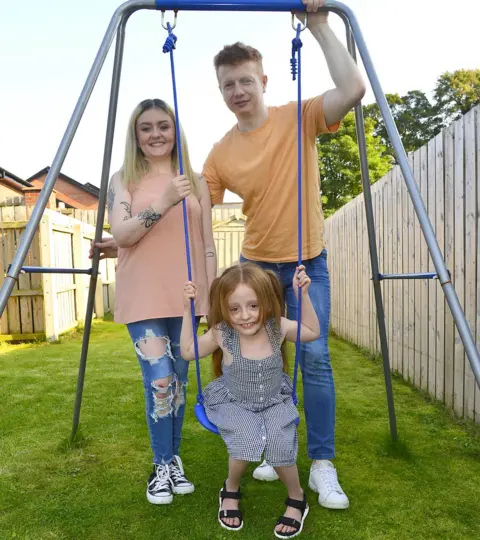Child wore nappy to school due to lack of appropriate toilets
A young girl with a rare bone condition had no choice but to wear a nappy to school because it did not have an accessible toilet, her mother has said.
Violet Heasley lives with osteogenesis imperfecta, or brittle bone disease.
She was the only wheelchair user at Dunmurry Primary School for two years.
Her parents brought a disability discrimination case against the school, which has been settled without admission of liability. It has since installed an accessible toilet.
The eight-year-old attended the school on the outskirts of Belfast for two years, in nursery and primary one.
'Where was her dignity?'
Shelbie Heasley said her daughter's experience was so stressful, she had to remove her from the school.
"She was humiliated there was no dignity for her - she didn't feel like she was like anybody else.
"It was just awful. Where was her dignity?" she said.
"She did not return after the initial school closures due to Covid.
"We were told that the toilet was approved, and necessary works would be carried out, but these weren't completed while Violet attended as a pupil at the school."
 ARTHUR ALLISON, PACEMAKER
ARTHUR ALLISON, PACEMAKERIt took months of hard work and persistence to find an alternative school that could accommodate her daughter's needs, said Ms Heasley.
"Since moving school - she's thriving, a social butterfly. At her old school she was very withdrawn - it's like night and day."
Dunmurry Primary School expressed regret for any upset to Violet and her parents.
As part of the case's settlement terms, the school has committed to ensuring its policies and practices conform with equality legislation.
The school will also liaise with the Equality Commission, which supported Violet's parents in taking the case.
'Still traumatised'
"Every child must have equality of access to a quality educational experience and must be given the opportunity to reach his or her full potential," said Geraldine McGahey, chief commissioner of the Equality Commission.
"A little bit of communication, a little bit of respect for a child's needs, would have made a massive difference. Putting the child at the heart of this, I think a lot of this could have been avoided," she told the BBC's Good Morning Ulster programme.
"Violet was and still is traumatised by her experience - of having to be made to feel different."
Ms McGahey added that Ms Heasley had to go through multiple schools to find one suitable for her daughter.
"She had to go round to eight or nine schools before she could actually find one that had facilities that would meet Violet's needs."
The Disability Discrimination Act 1995, which protects disabled people against various forms of discrimination, does not apply to primary and post-primary schools.
Schools in Northern Ireland do not have a statutory obligation to put accessible toilets into schools.
 Arthur Allison, Pacemaker
Arthur Allison, PacemakerMs McGahey said the Special Educational Needs and Disability (Northern Ireland) Order 2005 is a protective order for disabled children but it doesn't have the same protections as the Disability Discrimination Act (DDA).
"Whilst they [the school] did have disabled toilets that might have accommodated children with some needs, it wasn't suitable for a wheelchair user - DDA didn't apply so we used this other legislation to get reasonable adjustments made."
Asked about why it took so long for the school to install an accessible toilet, Ms McGahey said it wasn't a budget or Covid-related issue,
"This goes back to 2018, 2019, before Covid when budgets were not under the same pressure they are now, there's still no real explanation apart from using Covid to why it took so long to get the work undertaken."
Violet's case was taken by her parents on her behalf to the Special Educational Needs and Disability Tribunal. No financial compensation is available where a claim of discrimination is found.
